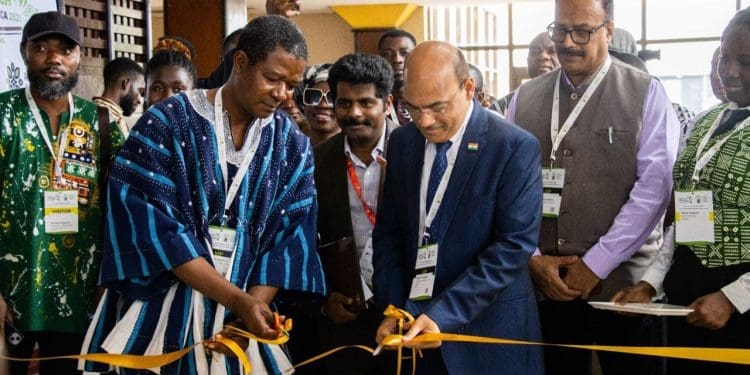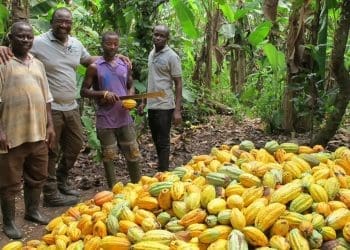The Indian High Commissioner to Ghana, Manish Gupta, has assured Ghana of India’s unwavering commitment to support the country’s agricultural sector with technology, expertise, and investment, in line with the Government of Ghana’s Big Push Agenda.
Speaking at the Agritech West Africa 2025 Exhibition, a two-day international agricultural trade fair held in Accra last Friday and Saturday, at the Accra International Conference Centre, Mr. Gupta described Ghana’s agricultural sector as “promising and lucrative,” but stressed that it requires deeper investments and modernized practices to reach its full potential.
“We need to do more, and India is ready. With Ghana’s new government and its Big Push Agenda, we can work together to make Ghana food self-reliant and even an exporter of surplus produce to other countries,” he stated.
The High Commissioner underscored that agriculture is one of the fastest ways to accelerate Ghana’s economic growth, but achieving that goal would depend heavily on the adoption of science, research, and mechanization.
“We must embrace technology and science to improve productivity. India is committed to supporting mechanized plantation, crop research, and innovative farming solutions. We want to partner Ghana to enhance crop yields, improve post-harvest management, and scale up agro-industrial capacity,” Mr. Gupta added.
He further highlighted that Indian companies are already leading in agricultural machinery, irrigation systems, and food processing technologies, and these solutions can be adapted to Ghana’s local conditions to bridge existing gaps in food production. According to him, such cooperation would also create jobs, boost rural incomes, and make Ghana a regional leader in agricultural exports.
Ghana Positioned as an Agrarian Economy
For his part, Mr. Harry Bleppony, Deputy Director at the Directorate of Crop Services at the Ministry of Food and Agriculture, said Ghana remains committed to exploring new investment opportunities in agriculture, particularly with partners from India and other countries.
“Ghana is well positioned as an agrarian economy with boundless opportunities. We invite manufacturers, investors, and agric experts, particularly those from India who are here with us, to work closely with the Ministry of Food and Agriculture. Together, we can revolutionize the agricultural sector and align it with Ghana’s economic transformation goals,” he emphasized.
Mr. Bleppony said the government sees agriculture not only as a backbone of the economy but also as a driver of industrialization and trade under the African Continental Free Trade Area (AfCFTA).
Cross-Border Partnerships Critical
The two-day Agritech West Africa Exhibition attracted exhibitors, policymakers, and investors from around the world, with participating countries including India, Turkey, Nigeria, Ghana, China, Spain, the UK, Italy, and France.
The fair showcased a diverse array of agricultural products and technologies, from agrochemicals and modern irrigation systems to biofeeds, mechanized equipment, food processing innovations, and value-added food and beverage products.
According to organizers, the exhibition was designed as a hub for agricultural innovation and trade, providing a platform for cross-border partnerships, sustainable solutions, and private sector-led investments.
Private Sector’s Role in Growth
Mr. Rashid Kadiri, Chief Executive Officer of Croplife Ghana, stressed that while government policies are important, the private sector remains the true engine of agricultural transformation.
“What we are seeing here today is proof that agriculture is no longer about subsistence—it is about business, technology, and partnerships. We in the private sector are ready to drive innovation and create synergies that can sustain Ghana’s food systems,” he said.
Mr. Kadiri also called for stronger regional collaboration across West Africa to build resilient agricultural value chains, noting that challenges such as climate change, post-harvest losses, and financing gaps cannot be solved by one country alone.
Industry Players Driving Change
Adding to the voices of commitment, Director at TIAST Group, an exhibitor at the fair, shared how the company is poised to rejuvenate Ghana’s agro-industrialization agenda. According to Priscillia Fiati, Director of Business Development at TIAST, the group is providing agro-processing support through mechanized plantation services, technological and technical assistance, financial services, and offtake arrangements.
The most striking offer, she noted, is a 70% financial support package for individuals or businesses interested in setting up cassava starch processing factories in Ghana.
By PRINCE OPOKU DOGBEY, Accra














